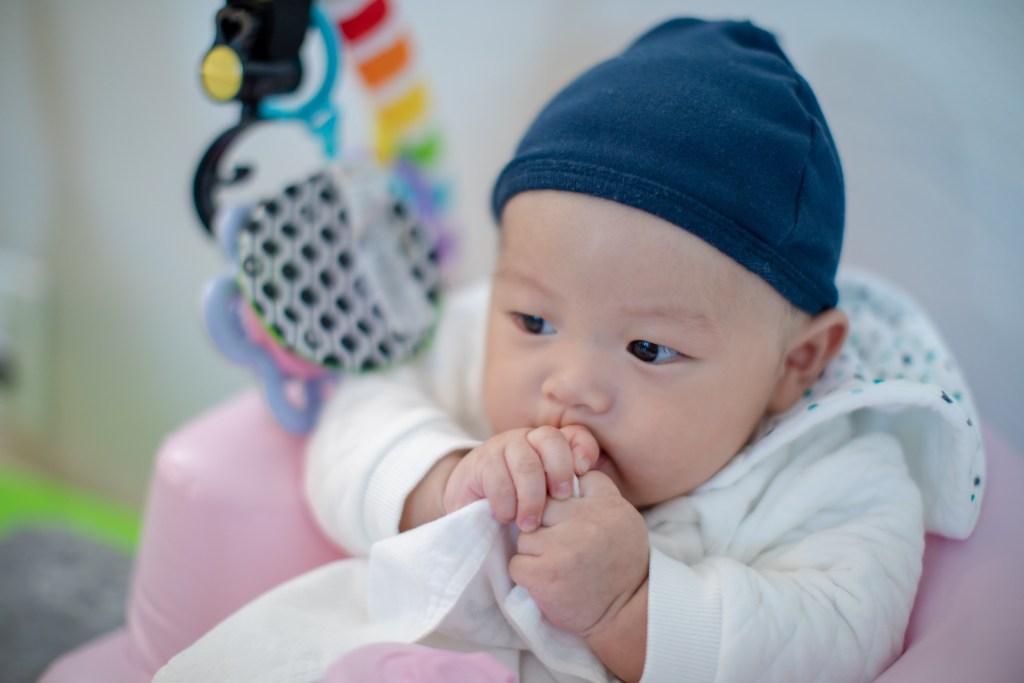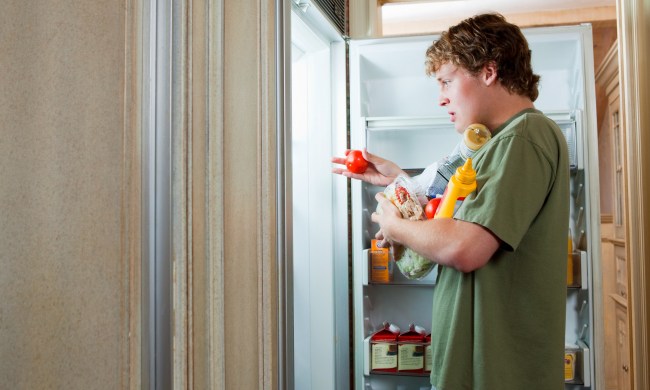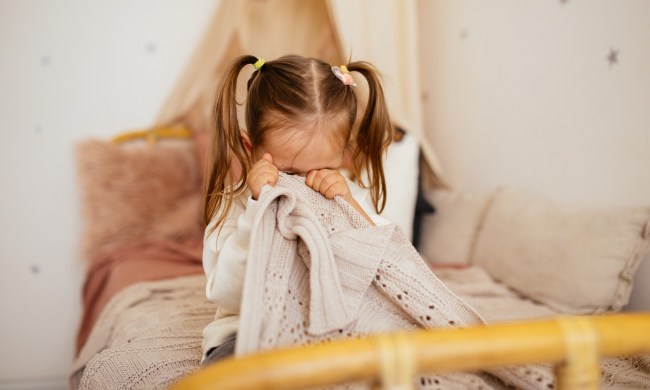It’s natural to wonder when you notice a behavior in your child that may seem odd, compulsive, or confusing. But is your baby chewing on clothes anything to worry about? And how can you get them to stop? The good news is there are plenty of ways to save your kid's clothes and help your child feel better.

Why do babies chew on their shirts?
Babies will often chew on anything in sight when they are teething, and the top of their onesie is many times the easiest (or only) thing in reach. This is normal and usually goes away as their teeth pop out. Chewing on toys, fingers, clothes, and just about anything while teething gives their gums some comfort and relief. Teething usually takes place from around 4 months to 2 years old.
It’s also developmentally expected for babies to mouth many objects (including blankets and clothing) as a form of discovery. They’re learning awareness of their mouths and tongues that will lay the foundation for those first babbled syllables. Once they can grab (around 3 to 5 months old), they’ll often make a beeline for their mouth with whatever they pick up. They’re using the sensory nerves in their mouths to figure out textures, tastes, and temperatures and learn about the world around them.
Whether teething or mouthing, babies usually grow out of this behavior by 3 years old.

Why do kids chew on their shirts?
If a child over 3 years old is still biting their shirt, it could be because of several possible reasons.
- Chewing is a fidgeting behavior to help them focus.
- Chewing reminds them of eating, which relaxes them.
- They could have a dental issue that’s bothering them.
- They have pent-up physical energy, so they are engaging in a small physical movement.
- They have weak jaw muscles and are strengthening them.
- They may have a condition called pica, where people (especially children) eat nonfood items.
- It could be a sign of a sensory disorder or anxiety, and they are chewing for sensory calming.
As always, check with your pediatrician or pediatric dentist if you’re concerned.
How do I get my child to stop chewing their clothes?
With babies and toddlers, the cause of clothes chewing often starts in the mouth. For older children, the trigger can be more difficult to pinpoint. Regardless, there are methods to help get your child to stop chewing on their clothes.
Step 1: Try to discover the cause of your baby or older child chewing on their clothing.
For babies, it may be as simple as teething or sore gums, and chewing on an object makes it feel better. With older children, try to notice a pattern of when the behavior happens. Is it when they’re nervous? Hungry? Trying to concentrate? That will give you clues as to why they are chewing their shirt, and then you can find a solution from there.
Step 2: If the chewing is due to teething and gum pain, have teethers available for babies and toddlers that are room temperature and cold.
A cold teether from the refrigerator or freezer helps ease their pain. You can also clip teething toys to their clothing so that they can pick it up even if they’ve crawled elsewhere or dropped it while in their highchair. Wash and sanitize teethers in between use. Older kids get mouth discomfort, too. Is a tooth loose or a cavity brewing? Ask your child if their teeth or gums are hurting.
Step 3: If the cause is sensory for babies and toddlers instead of comfort for painful gum, try sensory toys.
The sensory toys will scratch that same itch. Look for silicone toys shaped and sized to avoid choking hazards that have interesting textures and are easy for little hands to grab.
Step 4: Engage your older child in a different activity to take their mind away from chewing their shirt.
Physical activities like riding a bike or catching a ball are helpful, as are games and chores.
Step 5: Offer an alternative to chew on, such as dried fruit.
Step 6: Try fidgets or stress balls.
If your older child is struggling with chewing their clothes and you notice it more when they are anxious or trying to concentrate, a fidget or a stress ball is a great option for reducing stress and helping your kid focus on an activity like homework.
Step 7: Talk about it.
Kids get anxious and worried, just like adults. If you notice your child's chewing on their shirt may be related to anxiety or a worrisome problem, talk it out.
Step 8: Show your child how to do to breathing exercises when they feel like chewing on their clothing.

Step 9: Give family yoga a try.
If stress and anxiousness are at the root of an older child's shirt-chewing problem, yoga is an option and a wonderful family-friendly physical activity.
Step 10: Consult your pediatrician or pediatric dentist.
If you've given all the other options a try and still can't make headway with your child's shirt-chewing habit, talk to your pediatrician or pediatric dentist to rule out any physical issues.
Babies and children will often outgrow this behavior, but it could be a sign of autism, anxiety, or other conditions if they don’t. You can ask your pediatrician for screening and support to ensure they’re given all the treatment and resources they need.
Want more? Learn how to stop your kids from biting their nails with our top tips, or find out how to screen your teen for anxiety.




